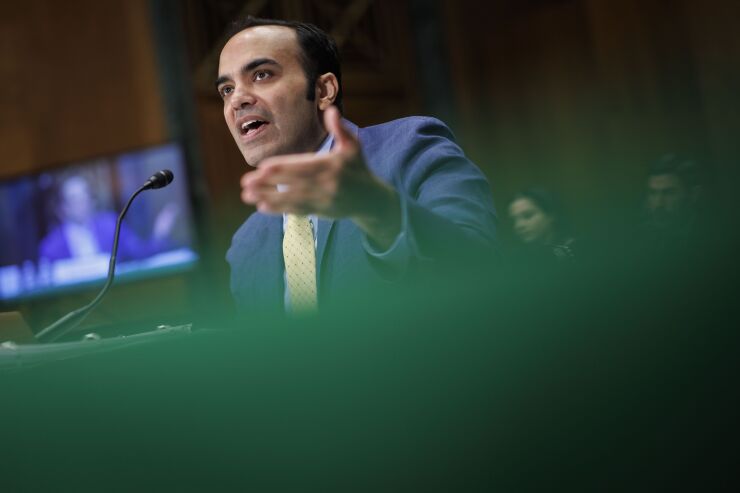
WASHINGTON — Consumer Financial Protection Bureau Director Rohit Chopra in front of the Senate Banking Committee defended the bureau from a new line of attack about its funding structure, recently
Chopra, testifying in the first of two days of oversight hearings in Congress, touted the bureau's recent proposals and rulemakings, including
"There's a big difference between taking out a mortgage or credit card or auto loan versus a medical bill appearing on your credit report," Chopra said at the hearing. "There's been over a decade of empirical evidence to show a much higher rate of inaccuracy, and also the lack of predictive power, of medical bills to determine the repayment on other loans."
But the most tense moments of the hearing still centered — once again — around the funding structure of the bureau. While the Supreme Court ruled that the CFPB's funding structure is constitutional, the bureau's detractors have surfaced a new line of criticism.
The theory, laid out in an editorial for The Wall Street Journal by Harvard Law School's professor emeritus Hal Scott, argues that the CFPB cannot draw funding from the Federal Reserve System if the Federal Reserve System doesn't turn a profit, which Scott said it hasn't since 2022.
The line of questioning about the CFPB's funding was picked up by Sen. John Kennedy, R-La.
"You've been operating illegally," Kennedy said.
"No, that's not true sir," Chopra replied.
Chopra said that the CFPB has considered the theory, and that he and the bureau believe it's operating in accordance with the law that set it up in the aftermath of the 2008 financial crisis.
The theory has become a point of contention in recent days among financial lawyers and academics, with dueling blog posts and arguments both for and against the line of reasoning — Adam Levitan, a law professor at Georgetown University, called the line
Chopra also received several questions on the growth of nonbanks and fintechs like buy now/pay later loans, and use of artificial intelligence in the financial sector. On nonbanks, Chopra said that the sector is growing, and that he would like to work with Congress to develop more robust oversight.
For artificial intelligence, Chopra said that he's concerned about the potential for generative AI and other ways that humans can be simulated to create "an enormous amount of fraud in the financial system, and the weaponization of people's personal data."
He also said that he's worried about "foundational" AI models when it comes to financial stability.
"I think there will probably be just a handful of them, for which most of the industry will be built on top of that," he said. "And when there are problems with one of those foundational models, we could really see issues that occur throughout sectors of the economy, including the financial system."






